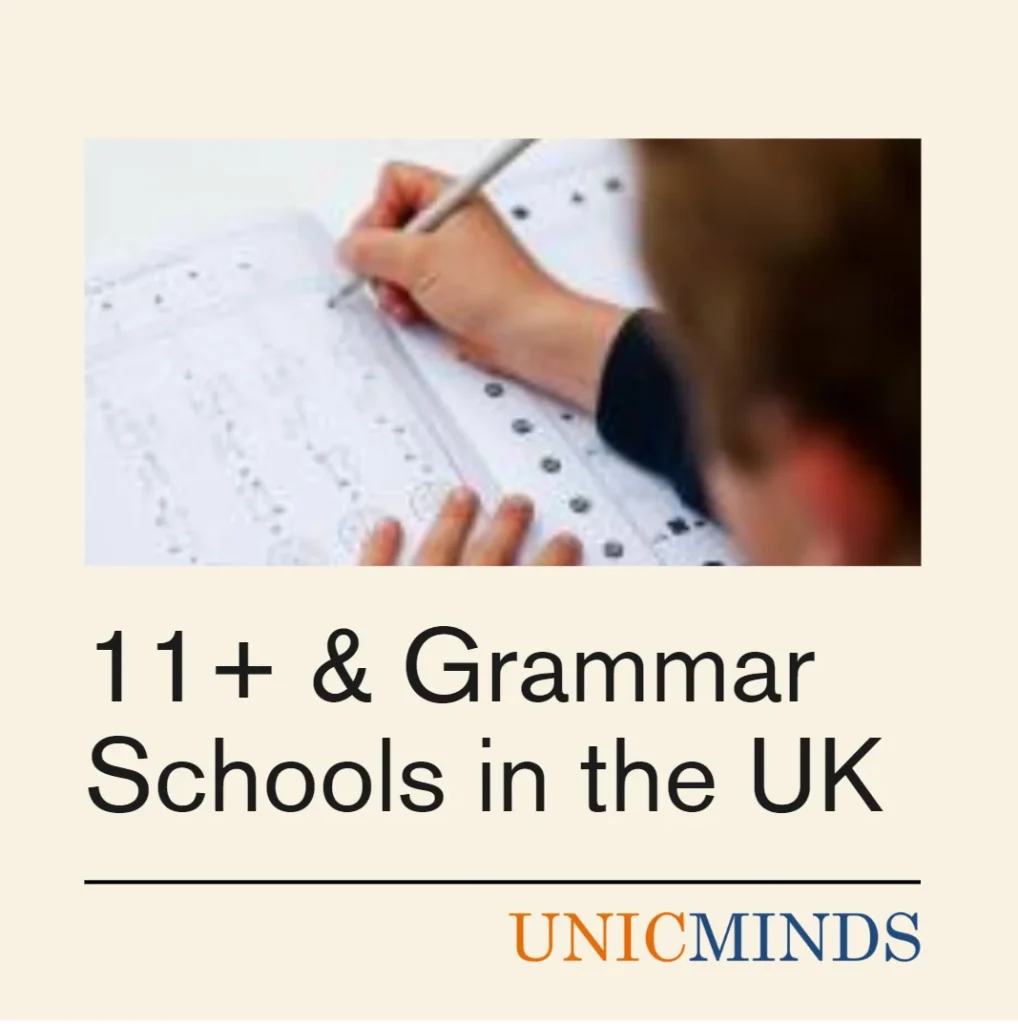Grammar schools in the United Kingdom select most of their students by ability. Out of a total of 3000 plus state-funded schools in the United Kingdom, only 163 schools (5 percent) are grammar schools. Normally, schools in the UK are prohibited to select their students based on ability, but Grammar schools are an exception to this rule. These 163 Grammar schools are unevenly distributed in England – 60% of Grammar schools are located in only 11 local authorities and all grammar schools cover in total only 35 local authorities.
Map of Grammar Schools in England – Wikipedia
As Grammar schools select on ability, it comes as no surprise that GCSE attainment scores such as Attainment 8 are higher in Grammar Schools than in other groups of schools. Attainment 8 and Progress 8 are two of the most important ways a school’s performance is measured.
About the 11+ Exam
The 11+ Exam is also known as the Transfer Test. It is the exam that is taken by some Year 6 students in primary schools in England. It is the primary way of testing who is qualified to go to Grammar Schools or to go to certain schools in England. Wales and Scotland no longer have Grammar schools. So, only students attending schools in England will take this test.
The test is usually taken after the summer holidays in the Autumn term in September. Usually, the school will take a practice 11+ test a few days before the actual one at school. If your child goes to the local authority primary school, then the test will be held in the school itself. If they go to another type of school, then they’ll be asked to come to a central location or to a particular school to take the test. But, please note that it is not compulsory for children to sit for the 11+ test.
Most grammar schools will open their registration for the 11+ exam in April or May for the following academic year, and parents need to register their child by June, July or August.
What does the 11+ test?
Like most reasoning and aptitude tests, the main four sections tested on the 11+ are:
- Non-verbal Reasoning
- Verbal Reasoning
- Maths
- English
Just like the CogAT in the US, the school and the testing teacher decides whether the students will give all the tests or only a select few. For example, children in Kent sit for a test in all four disciplines, whereas children in Buckinghamshire sit for just two papers, both in verbal reasoning.
The two main boards for the 11+ exam are: GL and CEM. The GL 11+ is used by the Grammar schools in Berkshire, Bexley, Buckinghamshire, Devon, Gloucestershire, Kent, Shropshire, Walsall, Warwickshire, Wirral and Wolverhampton. CEM administers the 11+ exams for Birmingham, Cumbria, Dorset, Lancashire Medway, Northern Ireland and Wiltshire. Schools in other counties including Devon, Essex, Hertfordshire, Trafford and Yorkshire use a combination of the GL and CEM exams.
11+ Test Scoring
Your child might get a score of Pass or Fail or the Standardised Secondary Transfer Test Score (SSTS). Students are required to have a minimum SSTS score of 121. But, this score doesn’t guarantee a Year 7 place at a Grammar School or an Independent school. Schools have their own admissions criteria which includes the SSTS score as a part of it.
Can your child retake the 11+ exam?
No, a student can take the 11+ exam only once.
One can always debate whether students appearing for the 11+ should get tutoring help or not. Why not! Yes, we know that the counter is to say – preparation might beat the objective of the test which is to test the raw smarts of the students. However, all tests in the world are designed and are prepared in the same way. So, there is no harm in preparing, not excessively, but in preparing enough to be comfortable with the question types and testing basics.
Hope this is useful, thank you.
You may like to read about: The Kangaroo Math Exam for Students Worldwide, PSSA Assessment – Grade 3 to 8, & App Development for Kids

